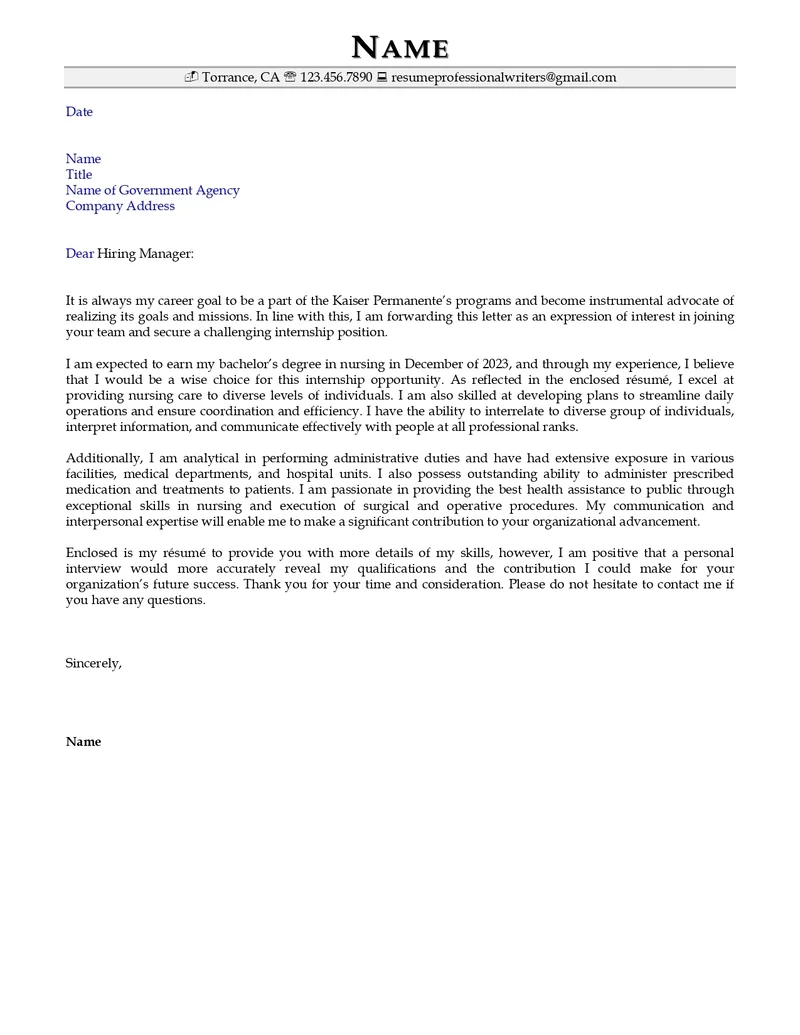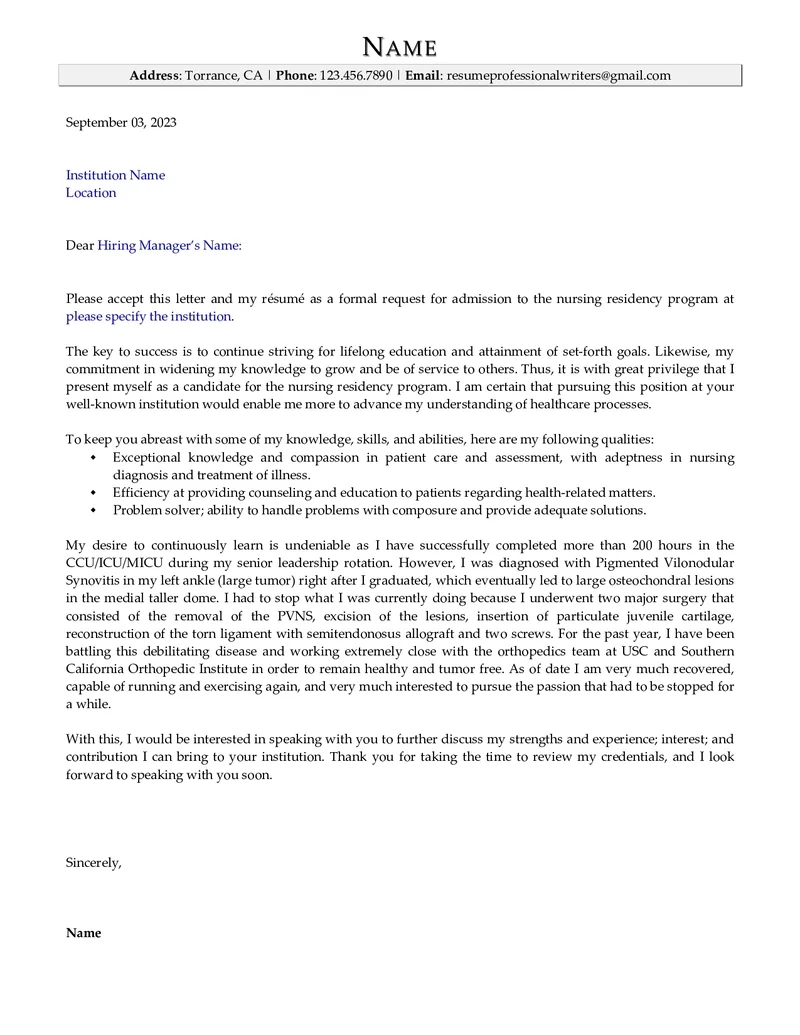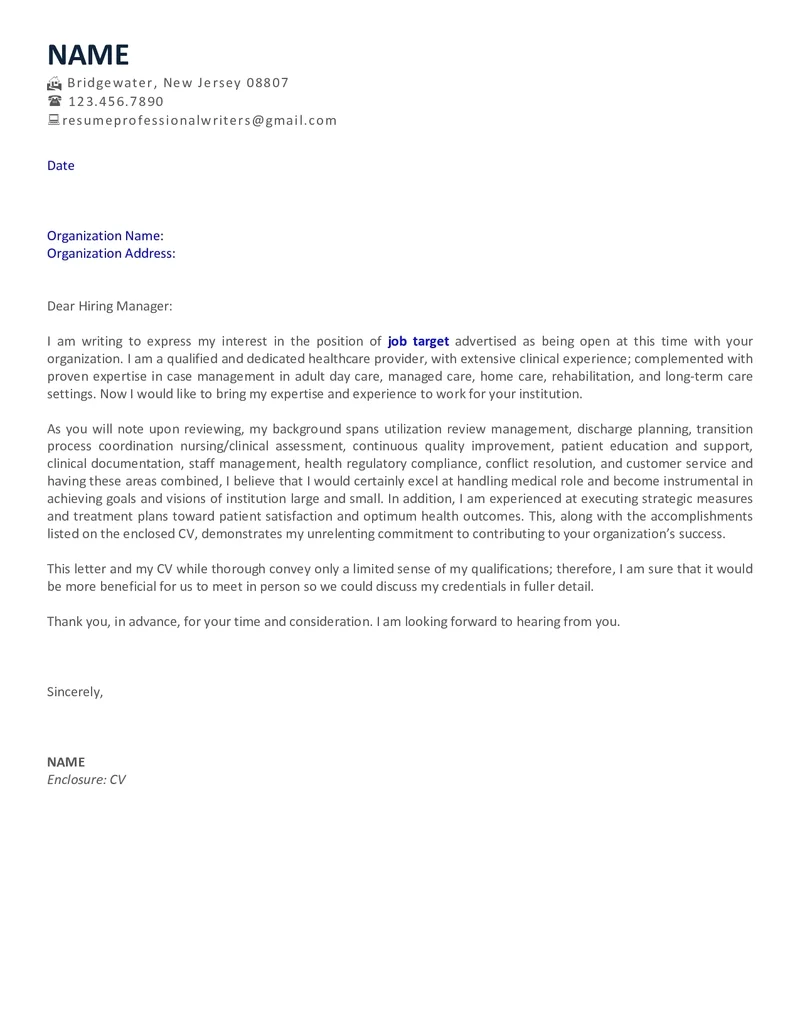A nursing cover letter should serve as a complement to your resume; providing an overview of the nursing position you are applying for that is in line with your nursing experience. This document should effectively highlight your accomplishments, skills, and experiences, offering a more comprehensive understanding of your capabilities.
To distinguish yourself from other applicants, personalize your nursing cover letter by emphasizing unique qualities and attributes from your resume that reflect your individuality. Regardless of whether you are a newly-graduated nurse or an experienced nursing professional, a well-crafted cover letter sets you apart from other applicants. Moreover, you can reap multiple benefits that can help you get called for an interview.

Benefits of Writing a Cover Letter
The inclusion of a nursing cover letter is not only an important element of your job application; it also serves as the initial point of contact, shaping the hiring manager’s first impression of you. Additionally, employers generally give preference to resumes that are supplemented by a cover letter. Many nursing job applications at a known hospital or organization require a cover letter that will increase your chances of getting hired.
Here are the advantages of a well-written letter:
1. Leaves an impression that you are serious about the job
A cover letter serves as a proof to your genuine interest in the nursing position, demonstrating that you have conducted thorough research on the organization to ensure a mutually beneficial fit. It may also incorporate specific nursing terms from the job description, underscoring the alignment between your professional values and company values.
2. Highlights your unique character traits
While your resume serves as a factual summary of your qualifications and experience, a cover letter provides the opportunity to highlight your personality and specialized skills. It is important to focus on attributes that directly make you suitable for the role.
3. Exhibits your proficiency in written communication
A multitude of nursing positions needs robust writing skills. Crafting an articulate cover letter with a good opening paragraph serves as evidence of your effective communication skills. Writing your nursing cover letter must be error-free. You need to keep an eye on spelling and grammatical inaccuracies. Having such errors could be a detriment to your application.
4. Creates a possibility to open discussions during the interview
The content in your cover letter may prompt interviewers to venture beyond their prepared set of questions, initiating a more open and dynamic dialogue during the job interview. This is advantageous because you have the freedom to bring an interactive discussion toward connection with the interviewer.
5. Persuades the hiring manager to call you for an interview
A strong cover letter explains to a hiring manager why you are the ideal candidate for the position. Prior to deciding who to interview, hiring managers frequently sift through a lot of cover letters. Get their attention by choosing unique, persuasive, and creative sentence structures.
What Should Be Included in a Nursing Cover Letter?
Many job seekers frequently struggle to understand the format and substance of a strong cover letter. The approach in writing a cover letter offers a more personalized way to showcase your qualities, such as passion and motivation, which a resume can’t capture.
It is important to concentrate on clearly communicating your qualifications for the position, the value you would provide to the organization, and your compatibility with the culture. Having a cover letter outline is essential in planning your cover letter for a nursing job.
Cover Letter Introduction
The initial paragraph of a cover letter serves as your introduction to the recruiting manager and your opportunity to exhibit interest in the position. This section establishes the overall tone for the letter and seeks to grab the employer’s attention. A good opening grabs the reader’s attention and compels them to continue reading, which creates the ideal environment for you to discuss why you are the most qualified applicant.
The Body
Middle Section
Draw powerful correlations between your competencies and the job requirements laid out in the position description. Specifically portray how your skill set and professional experience are aligned with the role for which you are applying. For ease of readability, consider utilizing succinct paragraphs or a bulleted list to showcase your qualifications.
Concluding Remarks
In the closing, add “I would like to express my sincere gratitude for your consideration of my application for this role. Thank you for the opportunity to apply for this position.” Then, you will sign your name on a printed or digital copy of a cover letter.

What Else to Include in a Nursing Cover Letter?
Relevant Keywords
Use appropriate keywords when submitting your nursing cover letter. Doing so enhances the likelihood that your application will successfully navigate through the applicant tracking system and reach a hiring manager for review. To identify the most relevant keywords, scrutinize the job posting to pinpoint terms that align with the required skills and qualifications.
Nursing Certifications and Qualifications
Highlight your educational background, including your nursing degree and any special certifications such as ACLS, AACRN, and PALS, among others. Showcase relevant clinical experiences, internships, and previous nursing positions. Use specific examples to demonstrate your competencies in nursing, such as patient care and clinical and technical skills.
Common Mistakes to Avoid When Writing a Nursing Cover Letter
There is no need to worry because even seasoned job seekers can make mistakes when writing a cover letter. When applying for a job, think of your cover letter as the equivalent of a firm handshake — it introduces you to potential employers. An effective cover letter should project strength and provide a positive first impression.
To have a strong cover letter, avoid making the following mistakes:
1. Starting Off with a Weak Opening Paragraph
In writing a nursing cover letter, many job applicants find it challenging to create a convincing opening. This hindrance often leads to an introduction that lacks impact and fails to capture the hiring manager’s attention.
2. Highlighting Different Qualifications
A cover letter should be both targeted and tailored. There has to be a link between your qualifications and the specific skills and responsibilities required for the position. Failing to make this connection affects your chances of securing an interview.
3. Outlining Weak Selling Points
Your letter serves as a persuasive marketing tool that positions you as the ideal candidate. Similar to your resume, it should clearly outline the primary reasons you deserve an interview. It is best to accentuate your most notable achievements.
4. Making It Long for Hiring Managers to Read
If your cover letter extends beyond a single page, you risk losing the reader’s attention. An effective cover letter is both succinct and engaging; while respecting the reader’s time.
5. Using Different Formats
For a more polished and unified job application, it’s advisable to ensure that your cover letter and resume share the same design elements, including font and format. This results in a cohesive and professionally branded application package.
What Kind of Font Should You Use for a Cover Letter?
You might not be aware of it, but research has shown that the typeface you encounter can shape your perceptions and expectations. Clearly, you’ll want your cover letter’s font to communicate key attributes — such as professionalism, expertise, and suitability for the role.
So, how do you find the best font for your nursing cover letter? We’ve got you covered. Below are three of the recommended font styles you can use for your nursing cover letter.
Helvetica
This typeface is a great option for job seekers in business, marketing, or sales because it is frequently used in the names of significant brands.
Cambria
This font was created to read well on screens and in small sizes, making it an excellent choice if you anticipate printing your cover letter.
Arial
The sans serif family’s most understated member is arguably Arial. This typeface looks well in practically every professional sector cover letter thanks to its simple, clean appearance.

How to Write a Nursing Cover Letter
To secure a nursing position, it’s imperative to have a well-crafted and succinct cover letter that articulates your qualifications. This entails showcasing your proficiency in patient interaction, demonstrating a profound capacity to perform clinical administrations and technical acumen.
Here are tips on how to compose a compelling letter for nursing role:
1. Conduct Research
Prior to composing your cover letter, engage in comprehensive research regarding the company’s culture. This will enable you to harmonize your professional values and skills with the organization’s mission and requirements.
2. Place a Header
Including your contact information, such as your email address, phone number, and location (city and state), is a standard practice. By placing these details at the document’s header, you enhance the reader’s ability to check the necessary information to reach out to you.
3. Be Relevant
Add nursing-related, credentials, skills, and experience on your cover letter. Identify any relevant education and work history that you may have. Mention unique abilities or accomplishments that make you a qualified candidate.
Guidance for recent graduates: Every facet of your experience holds value, especially if you are lacking industry-specific work history. If you don’t have direct experience in healthcare, you can underscore your willingness to quickly adapt to new procedures and notable achievements from your clinical training in nursing school.
Tips for nurses changing specialties: Provide a concise career overview and spotlight the skills you deem most transferable to your intended specialty. Put emphasis in strengths that have a direct correlation with the requirements stated in the job posting.
Nursing Cover Letter Examples
By dedicating time and effort, you can skillfully compose a compelling nursing cover letter that effectively sets you apart from other candidates. To guide you in this endeavor, we offer samples of cover letters, providing you with valuable insights for your writing process.
Student Nurse Cover Letter Example

New Grad Nurse Cover Letter Example

Registered Nurse Cover Letter Example

Take Charge of Your Career Trajectory with the Help of our Experts
Your nursing cover letter is your first impression in the world of healthcare, and when written well, it’s a persuasive tool that can lead to new chances. Let our professional resume writers and cover letter writers assist you in illustrating your commitment, expertise, and love for patient care. We’ll create a cover letter for you that not only enumerates your qualifications but also describes your individual nursing story and highlights your contributions to the medical institution.
Don’t fret! We’ve written job-winning nursing resumes and cover letters to advance the careers of many nurses just like you. Get started with us today and let’s capture the attention of hiring managers.








